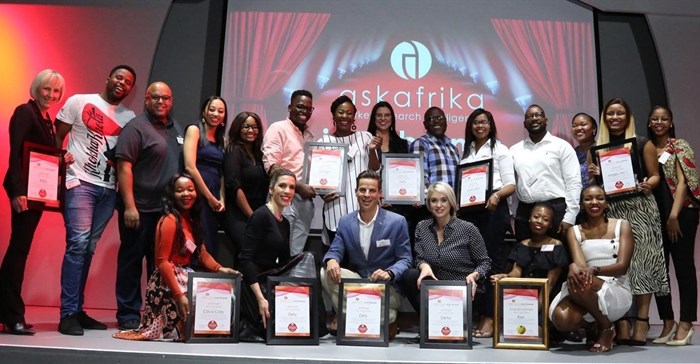
Subscribe & Follow
#AfricaMonth
Jobs
- Production Assistant Cape Town
- Brand Strategist Cape St Francis
- Brand Lead Westville
- Content Writer (Multidisciplinary Creative) Cape Town
- Multimedia Designer Sandton
- Sales Representative East Rand
In the news
Topline trends from the 2019 Ask Afrika Icon Brands survey
Consumers are overwhelmed and are becoming extremists – self-orientated, demanding and tech-savvy.
The way that consumers interact and engage with brands is fundamentally different from five years ago. Consumers now traverse the physical and digital worlds and live in a fluid world. They are used to switching between these dual realities – and there is an increased tendency to switch between brands.
Consumers are extending their brand repertoires and there is less solus usage (where consumers use only one brand within a product category). There are, however, certain brands that South Africans across the board continue to love and stick to.

The Ask Afrika Icon Brands is the largest annual benchmark survey of its kind and, now in its 10th year, measures loyalty across 237 brand categories and thousands of brands. Despite the challenging consumer landscape, 50 brands achieved Icon Brand status in the 2019/20 Ask Afrika Icon Brands – with 12 new brands entering the prestigious ranking.
Is loyalty still relevant?
Consumer behaviour cannot be understood in isolation and needs to be contextualised within the landscape of global and local realities and lifestyle trends.
Loyalty levels are declining in all spheres of life and brand owners need to question whether it is realistic to continue expecting consumers to remain loyal to their brand when they are not loyal to anything else – including religion, politics, work or relationships.
An overwhelmed society and the impact of technology
Brands are widening their scope to gain market share and it seems that every brand is targeting almost every consumer. This leads to consumers feeling overwhelmed and like they’re targets. The extreme brand personalities stand out. There is an increased awareness among consumers of manipulative brand strategies, even though they endorse or are complicit in co-creating this cycle of manipulation.
The line between enticement and addiction is blurred. We have become addicted to efficiency-driven lifestyles – which transcends instant gratification. We expect everything to be frictionless: experiences should mesh into our lifestyles and everything we consume – from food to technology and apps – to allow us to dedicate more time to our professional and social lives.
Technology has a huge impact on consumers and South Africans spend a significant portion of their time online. We have a compulsion to share everything on digital media.
In essence, this has resulted in jumping jack engagement, where we jump from one exciting or dramatic discourse to the next, from one fad to another. It creates a breeding ground for dysfunctional behaviour and extremist behaviour in an extremist society.
There is an endless need for more – and a sense of crave-ability or stickiness that makes it hard to exit the happy kingdom of consumerism. This will be the year that consumers seek to find balance in a world that is rapidly tilting out of control.
Obsession with self and the rise of individualism
The general consumer sentiment is: “Everything and everyone wants more from me and I want more from them. I know more, I expect more and I judge more. I’m significantly more informed. I desire authenticity on my own terms. It is supposed to be all about me.”
This obsession with self is reflected by a shift in the types of brands and products that are now securing icon brand status and the ones that are falling off this list. Consumers are increasingly spending money on themselves.
There is a trend towards the collapse of collectivism and the rise of individualism, which implies that successful brands will be those that relate to consumers on a granular level. Brands that move beyond transactional engagement to experiential retailing and truly engage with consumers on a psychological and emotional level will stand the test of time.
What is happening in the world today is no ordinary disruption. We have developed complicated relationships with retailers, brands and loyalty programmes – and this has resulted in layered fragmentation.
Consumers are price-sensitive
Nonetheless, price remains a driving factor in consumer choice – and promotions, loyalty programmes and benefits from a variety of retailers come into play. Consumers are price-sensitive and this has become a key influencer in an environment in which they have a wealth of choice.
Young people are no longer absolute luxury shoppers; they mix and match the high with the low to express their personal style.
Sustainability and a regenerative reality
Another trend this year, driven by younger generations, is an increased focus on sustainability – the loyal consumer market has a high percentage of engaged green consumers. These consumers are willing to make changes in their personal lifestyles but expect the same from the brands they use. They are breaking away from stereotypes into a more fluid sense of identity.
We are moving towards a regenerative reality in which people are taking action to improve the world in which we live.
Social capital is an important factor in driving consumer behaviour: 87% of consumers surveyed said they’d purchase a product because a company was advocating for an issue they cared about; 75% would refuse to purchase a product if they found out a company supported an issue contrary to their beliefs; and 86% of consumers want brands to take a stand on social issues.
There has been a trend to support local brands for some years and this continues in 2019.




















